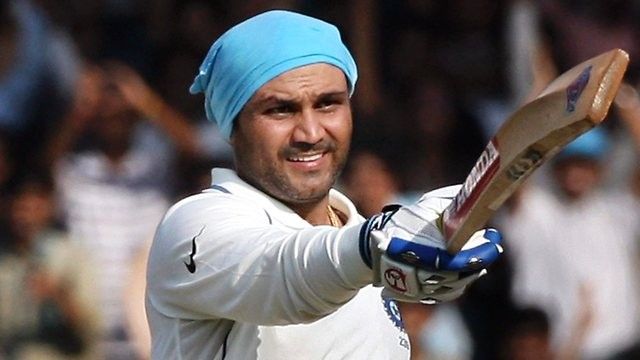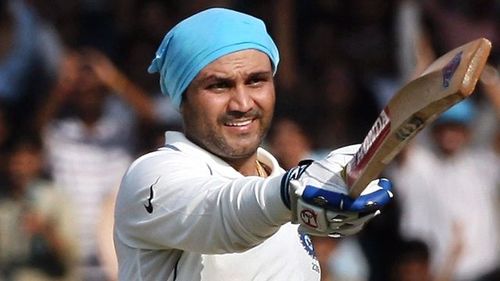
Virender Sehwag's childhood coach praises his humility
AN Sharma, Virender Sehwag’s childhood coach thinks that it is the prolific batsman's "helping attitude" that best defines him. His coach reminisces whether it was on the field or off it, Sehwag would never say no to anyone asking for help.
"Whenever I needed things for the academy and asked him for them, he would immediately provide them. There were times players would get selected for the state and they wouldn't even have kits. I would send them to Sehwag, and he would provide them with his bags," Sharma told ESPNcricinfo.
The 37-year old would usually make a journey to Meerut to pick bats for himself and on one such occasion, he brought back 14 bats for himself. Sharma recounted an incident where Sehwag gave away all his bats to the students of his academy. "I would usually select the bats for him. I told him I didn't like any of the 14 he brought back. I knew none of those would suit him. He immediately distributed all the bats among the boys of the academy," said his coach.
Sehwag at the beginning of his career
Sharma’s association with the swashbuckling batsman began in 1993. What intrigued him was the fact that Sehwag never tried to change his style of batting. "I would never discourage him from playing his shots. I never told him not to hit the ball. If you are hitting it, hit hard. Whenever I taught him kitab waale [textbook] strokes, it would get difficult for him, so I wanted him to improve on his natural game," he said.
Sharma narrated the story of a match which he felt was the beginning of Sehwag's reputation as a destructive batsman. "In January 1994, the Delhi school's cricket team was playing in Indore. I was the coach then. The mentality [in such tournaments] is to have two tough sides play each other. At least one would be out of the way then. Delhi's first match was against UP [Uttar Pradesh], who used to be a good side. UP had set us a target in the range of 250. I used to bat Viru in the middle order then. The first ball he faced from a very fine bowler from UP - I don't remember his name now - he hit him for a six over point."
Sharma further added the bowler couldn't bowl after that, and Sehwag finished the match after hitting several big shots. "When I met the bowler later, he told me: ‘Sir, that was my best ball and he hit me for a six. I was very demoralised after that.’ Nobody thought that Delhi would win this match against UP, because they had the best attack, and very good batsmen. Viru singlehandedly took the match away. He never looked back after this."
The Delhi batsman’s mischievous streak
Sharma recollects that the former Indian opener was also mischievous by nature, and would never shy away from cracking jokes or playing pranks. "Inki ek badmaashi thi [He had a certain mischievous trait]. There was a time when I would only commute by bus, so I would get late. So Viru, once he sensed I was late, he would take the new ball and bowl. He used to tell the other boys to not let on about him taking the new ball. The boys also would remain silent and not tell me. He wasn't the captain but would behave in a way."
However, his mischievousness never detracted the Nawab of Najafgarh from his ability to knuckle down and focus on the field. "The dedication that I saw in him I haven't probably seen that in anybody. When he plays cricket, he is mentally, physically there.”
"When I chided him once about getting out in a particular manner, he listened to it with intent and took it on board. He ensures that other players are also disciplined."
Sharma, who will turn 72 next month, said his relationship with Sehwag and his family had always remained warm. "We were just like family. Whenever his mother made something special, I would always be sent for it.”
"When he got married, there was the Milni ritual to be completed. His father said that Guru number one pe aayega [the teacher would be given first priority], and made sure I was at the forefront. That was a great honour."
Sharma was glad that his famous pupil had made him famous as well. Sehwag’s international recognition is the reason why the media chose to speak with him in the first place, the coach concluded.
